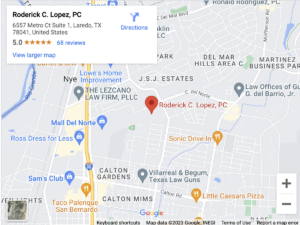
You can win punitive damages (“exemplary damages”) as the result of a personal injury claim. The purpose of punitive damages is to punish the defendant, not to compensate you. Notwithstanding that, the money still goes to you. Economic damages and non-economic damages, by contrast, are compensatory damages designed to restore your losses.
Punitive damages are difficult to win even if you win economic and non-economic damages.
Roderick C. Lopez, PC can help you in your personal injury case so that you can recover the compensation you need and deserve. Contact us today or call (956) 529-7336, we will be happy to help.
What Kinds of Claims Are Most Likely To Generate Punitive Damages?
A Texas court might award punitive damages if the defendant’s misconduct was outrageous enough. It is difficult to predict when a court might award them, but in any case, you cannot receive punitive damages unless you ask for them. Types of claims that are particularly likely to generate punitive damages include:
- Wrongful death claims,
- Intentional “road rage” car accidents; and
- DUI accidents.
Many other types of cases are potentially eligible for punitive damages. It cannot be emphasized enough, however, that courts are very reluctant to award punitive damages even if you win your claim. There are never any guarantees.
What Do You Need To Prove To Win Punitive Damages in a Personal Injury Case?
To win punitive damages, you must prove (by “clear and convincing evidence”) that the defendant injured you through gross negligence, malice, or fraud.
- Gross negligence is a strong form of negligence. Perhaps you could call it “negligence plus.” To act with gross negligence, you must consciously disregard a known risk to someone else’s safety.
- Malice is an unlawful and likely malevolent intention, typically to cause harm to the victim. Taking a swing at someone (in anger) probably constitutes malice.
- In a punitive damages claim, fraud involves some form of deceit that injures someone. Simply swindling them is not enough in a personal injury claim–there must be bodily harm.
By contrast, to win economic and non-economic damages, you only need to establish general negligence in most cases.
“Clear and Convincing Evidence”
“Clear and convincing evidence” is an intermediate standard of proof. It is more difficult to meet than the “preponderance of the evidence” standard normally used for civil trials, but it is easier to meet than the “beyond a reasonable doubt” standard used in criminal trials. It should produce a firm belief in the minds of the jury of your entitlement to punitive damages.
Texas Limitations on Punitive Damages
Texas imposes a legal maximum on punitive damages. Normally, a court cannot award more than (2X economic damages) + (1X non-economic damages up to $750,000), or a total of $200,000, whichever of these two amounts is greater.
Jury Deliberation
Texas courts will not award punitive damages unless the jury unanimously approves them. A single dissenting juror can defeat your request for punitive damages.
Factors the Jury Must Consider
The jury must separately deliberate your eligibility for punitive damages, and it must consider at least the following factors:
- The nature and character of the defendant’s behavior;
- The degree of culpability of the defendant (malice would probably outweigh fraud, for example);
- The factual circumstances of the incident that generated the injury;
- The extent to which the defendant’s behavior offends public morals and standards of decency; and
- The defendant’s net worth.
The reason why the defendant’s net worth is relevant is that punitive damages of a given amount are not likely to deter a high-net-worth defendant as much as they would deter a low-net-worth defendant. The object is to modify the defendant’s behavior, and that means the amount of punitive damages needs to hurt.
Punitive Damages in Settlement Negotiations
You are much less likely to obtain punitive damages in settlement negotiations than if you file a lawsuit. Think about it. If you were the defendant, would you agree to pay punitive damages when a court probably wouldn’t award them even if you lost the case? Defendants agree to pay punitive damages only under extreme circumstances.
Punitive Damages and the IRS
If you win either economic damages and non-economic damages, or both, you generally won’t have to pay taxes on them (with some exceptions). Punitive damages, however, count as earned income subject to earned income taxation.
You’ll Definitely Need a Laredo Personal Injury Lawyer To Win Punitive Damages
A request for punitive damages is a complicating factor that makes it necessary for you to hire a lawyer. If you represent yourself, it’s difficult to win even compensatory damages, much less punitive damages. Contact a Laredo personal injury lawyer ASAP for a free initial consultation.

